- Home
- John Pearson
James Bond: The Authorised Biography
James Bond: The Authorised Biography Read online
JAMES BOND
John Pearson first met Ian Fleming back in 1954 when he was a young journalist, and Fleming, whose career as creator of Agent 007 had barely started, offered him a job as his assistant on the Sunday Times Atticus column. Pearson got to know Fleming well, and after his death in 1964, was commissioned to write what would become his highly successful ‘Authorised Biography of Ian Fleming’.
While researching this book, Pearson was struck by the way the character and life of James Bond overlapped with that of his creator, which gave him the idea of writing what become the parallel ‘Authorised Biography’ of 007. Since then Pearson has written many successful biographies, including that of the Kray Twins, the Dukes of Devonshire, the Getty family and the Clermont Club and Lord Lucan.
He and his wife, Lynette, live in a small book-filled house near Brighton.
Also by John Pearson
The Life of Ian Fleming
One of the Family: The Englishman and the Mafia
The Gamblers: John Aspinall, James Goldsmith and the Murder of Lord Lucan
JAMES BOND
John Pearson
Ian Fleming Publications Ltd
IAN FLEMING PUBLICATIONS
E-book published by Ian Fleming Publications
Ian Fleming Publications Ltd, Registered Offices: 10-11 Lower John Street London
www.ianfleming.com
First published by Sidewick & Jackson 1976
Copyright © Ian Fleming Publications and John Pearson 1973
All rights reserved
James Bond and 007 are trademarks of Danjaq, LLC, used under licence by Ian Fleming Publications Ltd
The moral right of the copyright holder has been asserted
This book is sold subject to the condition that it shall not, by way of trade or otherwise, be lent, re-sold, hired out, or otherwise circulated without the publisher's prior consent in any form of binding or cover other than that in which it is published and without a similar condition including this condition being imposed on the subsequent purchaser
ISBN: 978-1-906772-66-6
For Quentin Curtis
Contents
Title Page
Copyright Page
1 ‘This is Commander Bond’
2 Boyhood of a Spy
3 Les Sensations Fortes
4 Luminous Reader
5 Eve of War Games
6 Bond's War
7 Scandal
8 007 is Born
9 Casino
10 Vendetta
The Man and the Myth
11 Superbond
12 Bond Cocu
13 The Soft Life
14 The Truth about M.
15 ‘The Bastard's Gone’
1
‘This is Commander Bond’
I LIKE TO think that the plane was Urquhart's idea of a joke. He was the only one of them to have a sense of humour (he must have found it inconvenient at times in that grey morgue of a building up by Regent's Park where they all still work) and since he booked my tickets when he made arrangements for my trip he would have known about the plane. It left Kennedy at 4 p.m. for Bermuda. What Urquhart failed to tell me was that it was a honeymooners' special, crammed with newly-weds on packaged honeymoons in the sun.
There is something curiously unsettling about mating young Americans en masse. I had already had a two-hour wait at Kennedy from London, this on an icy January Saturday with the authentic New York sleet gusting against the windows of the transit lounge. Now for a further three hours I had to share this nuptial flight on mercifully false pretences. The roses, the Californian champagne were not for me.
‘Welcome aboard – this is the sunshine special, folks. For all of you just setting out together on life's greatest adventure, the congratulations of your captain, crew and Pan Am, the world's most experienced airline.’
Polite laughter. Some cheery fellow clapped. And in my lonely gangway seat I started worrying about my adventure.
Where did old Urquhart's sense of humour stop?
Between me and the window sat a nice young couple, suitably absorbed in one another. She was in pink, he in dark grey. Neither of them spoke. Their silence was disturbing, almost as if in disapproval of my so-called mission.
Dinner was served – a four-course plastic airline meal, a triumph of space-age packaging – and, as I munched my Chicken Maryland, crunched on my lonely Krispee Krackers, my angst became acute. Strangely enough, until this moment I had not bothered over my arrival in Bermuda. Urquhart had said I would be taken care of. ‘It's all laid on. Everything's arranged, and, from what I gather, they do one rather well.’ In London, words like these had sounded reassuring. One nodded and said ‘quite’. Now one began to wonder.
I had a drink, and then another and, as the big, warm aircraft thundered its way towards the tropics, tried going over in my mind the succession of events that had brought me there.
*
They had begun almost two years ago, after I published my ‘official’ life of Ian Fleming. It was an unusual book in the sheer spate of correspondence I received – from ballistic-minded Japanese, French teenage Bondphiles, crime-crazy Swedes and postgraduate Americans writing their theses on the modern thriller. I did my best to answer them. But there was just one letter which I had found it difficult to deal with. It was from Vienna from a woman signing herself Maria Künzler.
It was a long, slightly gushing letter written in purple ink and it described a prewar winter spent in the ski-resort of Kitzbühel with Ian Fleming. In my book I had dismissed this period of Fleming's life somewhat briefly. Fleming had been to Kitzbühel several times, first in the 1920s when he stayed there with some people called Forbes-Dennis. (Mrs Forbes-Dennis was, incidentally, the novelist, Phyllis Bottome.) Theoretically Fleming had been learning German, though in practice he had spent most of his time enjoying the mountains and the local girls. From the letter it seemed as if Miss Künzler had been one of them. Certainly her information about Fleming seemed authentic and she described certain friends from Kitzbühel I had interviewed for my book. This made a paragraph towards the end of her letter all the more baffling.
‘So you can understand,’ she wrote, ‘the excitement we all felt when the good-looking young James Bond appeared at Kitzbühel. He had been in Ian's house at Eton, although of course he was much younger than Ian. Even in those days, James was engaged in some sort of undercover work, and Ian, who liked ragging people, used to make fun of him and tried getting information out of him. James would get very cross.’
When I read this I decided, not unnaturally, that Miss Künzler was slightly mad – or, if not mad, then in that happy state where she could muddle fact and fiction. I thanked her for her letter, and merely wrote that her anecdote about James Bond had caused me some surprise.
Here I should make it plain that when I wrote the Life of Ian Fleming, I never doubted for a moment that James Bond was Ian Fleming, a Mitty-figure Fleming had constructed from his daydreams and his childhood memories. I had known Fleming personally for several years – the very years in fact when he was writing the early James Bond books – and I had picked out countless resemblances between the James Bond of the books and the Ian Fleming I worked with on the Sunday Times. Fleming had even endowed his hero with certain of his own very personal trademarks – the clothes, the eating habits, even the appearance – so much so that whenever I pictured James Bond it was always Fleming's face (and not Sean Connery's) I saw.
True, there had been certain facts which failed to tally with the Bond-is-Fleming thesis. Fleming, for one, denied it – strongly. In a way he had to, but it is a fact that the more methodically you read the Bond books, the
more you start to notice details which refer to James Bond's life outside the books – details about his family, glimpses of his life at school and tantalizing references to his early secret-service career and love-life. Over the thirteen James Bond books the sheer weight of all these ‘outside’ references is surprising, especially as they seem to be remarkably consistent. It was this that originally gave rise to rumours that Fleming, whilst including something of himself in James Bond's character, had based his hero on a real-life agent he had encountered during his time with British Naval Intelligence in the war.
One theory was that the ‘real’ James Bond had been a captain of the Royal Marine Commandos whose deeds and personality inspired Fleming. Another held that Fleming had carefully studied the career of the British double agent, James Morton, whose body was discovered in Shepheard's Hotel in Cairo in 1962. There were other rumours too. None of them seemed to hold much water, certainly not enough to make me change my mind about the Fleming–Bond relationship. Then the second letter came from the mysterious Miss Künzler in Vienna.
It arrived some three months after I had written to her, apologized for the delay and said that she had not been well. (From what I could work out, she would now have been in her mid-sixties.) It was a much shorter letter than the earlier one. The florid writing was a little shaky, but everything she wrote was to the point. She said that there was not much she could add to her earlier account of young James Bond. That Kitzbühel holiday had been in 1938, and she had never seen James Bond again, although she was naturally amused at the world-wide success of Ian's books about him. After the way that Ian had behaved it was funny, was it not? She added that Bond had written her several letters after the holiday. She might have them somewhere. When she could summon up the energy she would look for them and let me have them. Also she thought there were some photographs. In the meantime, surely there must be people who had known James Bond at Eton. Why not contact them?
I replied immediately, begging her to send the letters. There was no reply.
I wrote several times – still without success. Finally I decided to take Miss Künzler's advice and check the Eton records for a boy called Bond. Fleming had entered Eton in the autumn term of 1921. Apart from saying that James Bond was younger than Ian Fleming, Miss Künzler had been vague about his age. (Supposing, of course, that an Etonian called Bond had really been at Kitzbühel in 1938.) I checked through the whole of the 1920s. There were several Bonds, but none of them called James and none of them in Fleming's old house. Clearly Miss Künzler was wrong, but out of curiosity I checked on through the early thirties. And here I did find something. There actually was a James Bond who was recorded having entered Slater's House in the autumn term of 1933. According to the Eton list he stayed just over two years; his name had disappeared from the spring list of 1936.
So much for the records, which neither proved nor disproved what Miss Künzler said. An old Etonian called James Bond certainly existed, but he seemed too young to have known Fleming. It was unlikely that anyone of this age could have been caught up in the secret-service world by 1937.
I tried to find out more about this young James Bond, but drew a blank. A puzzled secretary in the school office said there appeared to be no file on him – nor had they any records of his family, nor of what happened to him. She suggested contacting the Old Etonian Society. I did, but again without success. All they could offer were the names of some of Bond's contemporaries who might have kept in touch with him.
I wrote to eighteen of them. Six replied, saying that they remembered him. The consensus seemed to be that this James Bond had been an indifferent scholar, but physically strong, dark-haired and rather wild. One of the letters said he was a moody boy. None of them mentioned that he had any particular friends, but no one had bullied him. There was no definite information about his home life or his relatives. The nearest to this was a passage which occurred in one of the letters:
I've an idea [my correspondent wrote] that there must have been some sort of trouble in the family. I have no details. It was a long time ago and boys are notoriously insensitive to such things. But I have a clear impression of him as a boy who had suffered some sort of loss. He was the type of brooding, self-possessed boy who stands apart from his fellows. I never did hear what became of him.
Nor, it appeared, had anybody else.
This was distinctly tantalizing for, as close readers of the Bond books will recall, these few extremely inconclusive facts find an uncanny echo in the obituary of James Bond, supposedly penned by M. himself, which Fleming published at the end of You Only Live Twice. According to this source, James Bond's career at Eton had been ‘brief and undistinguished’.
There was no reference in any of the letters to the reason M. gave for James Bond's departure – ‘some alleged trouble with one of the boys’ maids’. But there were two other interesting parallels. According to M. both of Bond's parents were killed in an Alpine climbing accident when he was eleven and the boy was subsequently described as being athletic but ‘inclined to be solitary by nature’.
None of this proved that the mysterious James Bond who had entered Eton in 1933 was Fleming's hero. As any libel lawyer knows, coincidences of exactly this sort are a hazard every author faces. Just the same, it was all very strange.
My next step was clear. Bond's obituary goes on to say that, after Eton, the young reprobate was sent to his father's old school, Fettes. Accordingly I wrote to the school secretary asking if he could tell me anything about a boy called Bond who may have entered the school some time in 1936. But before I could receive a reply, another letter came which altered everything. Inside a large brown envelope bearing a Vienna postmark was a short official note from an Austrian lawyer. He had the sad task of informing me that his client, Fraulein Künzler of 27, Friedrichsplatz had died, not unexpectedly, in her sleep some three weeks earlier. He had the honour now of settling her small estate. Among her papers he had found a note saying that a certain photograph was to be sent to me. In accordance with the dead woman's wishes he had pleasure in enclosing it. Would I be so kind as to acknowledge?
The photograph proved to be a sepia enlargement of a snapshot showing a group of hikers against a background of high mountains. One of the hikers was a girl, plump, blonde, extremely pretty. On one side of her, unmistakable with his long, prematurely melancholy Scottish face, stood Ian Fleming. On the other was a burly, very handsome, dark-haired boy apparently in his late teens. The trio seemed extremely serious. I turned the photo over. On the back there was a note in purple ink.
This is the only picture I could find. There seem to be no letters, but this is James and Ian out in Kitzbühel in 1938. The girl with them is me, but somehow I don't think you'd recognize me now.
So much for poor Miss Künzler.
The photograph, of course, changed everything. If the young tough really was James Bond – and why should the defunct Miss Künzler lie? – something extremely odd had happened. The whole idea of Fleming and the James Bond saga needed to be revised. Who was this James Bond Fleming had evidently known? What had happened to him since 1938? How far had Ian Fleming used him as a model for his books? The reality of Bond opened up a range of fascinating speculation.
I had not heard from Fettes, and there was still precious little evidence – a photograph, an entry in the Eton Register, a handful of coincidences – enough to pose the mystery rather than solve it. But there were certain clear lines now which I could pursue and did – but not for long. I had barely started contacting several of Fleming's friends from the Kitzbühel days when I was rung up by a man called Hopkins.
Once a policeman, always a policeman – there was no mistaking Mr Hopkins's voice. He understood from certain sources that I was making certain inquiries. He would like very much to see me. Perhaps we could have lunch together? Somewhat incongruously he suggested next day at the National Liberal Club in Whitehall Place.
Mr Hopkins was an unusual Liberal: a big, bald man with outs
ize eyebrows, he was waiting for me by the bust of Gladstone in the foyer. Something about him seemed to make old Gladstone look a little shifty. I felt the same. We had a table by the window in the big brown dining-room. Brown was the dominating colour – brown Windsor soup, brown walls and furniture. Mr Hopkins, as I noticed now, was wearing a somewhat hairy, dark brown suit. When the soup came he started talking, his sentences interspersed with noisy spoonfuls of brown Windsor soup.
‘This is all off the record, as you'll understand. I'm from the Ministry of Defence. We know about your current inquiries. It is my duty to inform you they must stop.’
‘Why?’
‘Because they are not in the national interest.’
‘Who says they're not?’
‘You must take it from me they're not.’
‘Why should I?’
‘Because if you don't, we'll have the Official Secrets Act down on you just so fast that you won't know what's hit you.’
So much for Mr Hopkins. After brown Windsor we had cottage pie, apparently the staple food of Liberals – nutritious doubtless, but no great stimulus to conversation. I tried getting Mr Hopkins to reveal at least something of his sources. He had been at the game too long for this. When we parted he said, ‘Remember what I said. We wouldn't like any unpleasantness.’
‘Tell that to Mr Gladstone,’ I replied.
It was all most unsatisfactory. If there were really any reason for keeping quiet about James Bond, I felt I had a right to know. I certainly deserved an explanation and from someone with a little more finesse than Mr Hopkins. A few days later I received it. This was where Urquhart comes upon the scene. Another invitation out to lunch – this time to Kettners. I said I wouldn't come unless he promised no more threats at lunchtime. The voice at the other end of the telephone sounded pained. ‘Threats? No, really – how unfortunate. Simply an intelligent discussion. There are some slightly sensitive areas. The time has come to talk …’

 The Bellamy Saga
The Bellamy Saga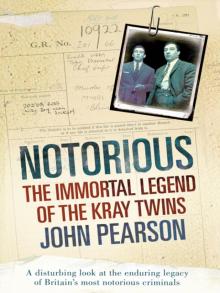 Notorious: The Immortal Legend of the Kray Twins
Notorious: The Immortal Legend of the Kray Twins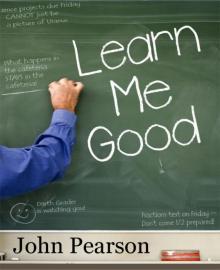 Learn Me Good
Learn Me Good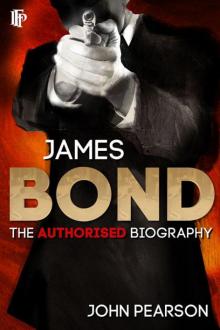 James Bond: The Authorised Biography
James Bond: The Authorised Biography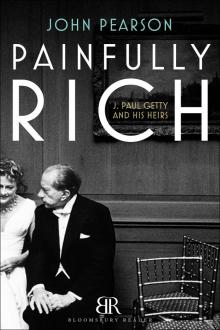 Painfully Rich
Painfully Rich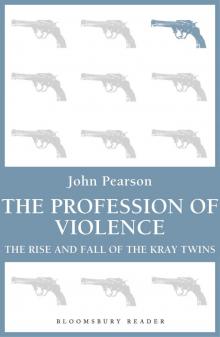 The Profession of Violence
The Profession of Violence Biggles
Biggles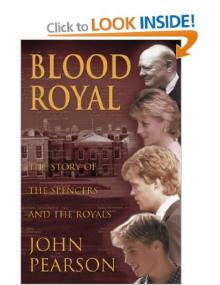 Blood Royal: The Story of the Spencers and the Royals
Blood Royal: The Story of the Spencers and the Royals